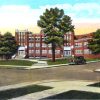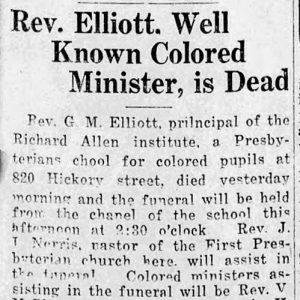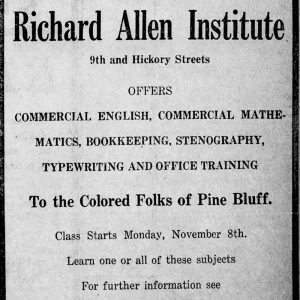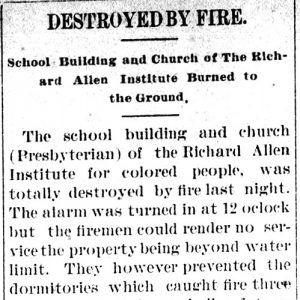calsfoundation@cals.org
Richard Allen Institute
The Richard Allen Institute in Pine Bluff (Jefferson County) was founded in 1886 by the Reverend Lewis Johnston and his wife, Mercy. By 1887, they were being assisted by Anna E. Grenage. Rev. Johnston remained in charge of the school until his death in 1903. It was named in honor of Richard Allen, secretary of the Board of Missions for Freedmen of the Presbyterian Church in the U.S.A. (PCUSA).
The institute was one of the earliest Presbyterian schools for African Americans founded in Arkansas. While the Board of Missions for Freedmen began opening schools for freed slaves in the South as early as the 1860s, work in Arkansas did not begin in earnest until the 1880s, when a new presbytery was established in the state and numbers of African Americans from the eastern states were resettling in Arkansas.
By 1889, the institute was considered the most important in Arkansas, and 200 students were enrolled. It was housed in the first story of a partially completed two-story building. By 1890, the building had been completed, and, by 1891, there were 250 students. In the following year, enrollment swelled to 330 students under the supervision of seven teachers. That same year, a new dormitory was constructed. In January 1894, the school building was destroyed by fire, and classes were moved to the dormitory building. In 1898, there were 222 students, thirty-three of whom were boarders.
In 1901, the institute advertised in The Freeman that it was chartered and “supported by friends specially interested in the amelioration of colored people.” Expenses were reasonable and “within the reach of live wide awake boys and girls.” The advertisement touted the school’s “home influence, pleasant surroundings, and thorough instruction.”
Rev. Johnston died in 1903, and the work was taken over by the Reverend T. C. Ogburn. Although Inez Parker writes in her book that the Reverend G. M. Elliott took over from Rev. Ogburn in 1914, the Reports of the Missionary and Benevolent Boards of the PCUSA for 1911 indicate that the Reverend Samuel J. Onque was in charge of the school. The Negro Year Book and Annual Encyclopedia of the Negro in 1913 and 1914 again list Rev. Onque as the principal. The enrollment those two years was 111 and 114. For some period between 1913 and 1915, the school was closed briefly for unknown reasons; sources differ as to exactly how long it was closed.
In 1916, Rev. Elliott took charge of the school. The institute had discontinued its boarding department due to inadequate housing facilities. In 1917, a report issued by the U.S. Office of Education indicated that the institute was a school of “elementary grade” with an enrollment of eighty students in grades one through seven. The campus was located on a full city block, and classes were held in a poorly constructed building with minimal equipment. The Office of Education recommended that the school be closed, but this recommendation was never followed. In 1919, Rev. Elliott resigned and was succeeded by the Reverend S. J. Elliott.
By 1921, the school was a co-educational boarding school offering junior and senior high school classes. The school year ran for thirty-two weeks. The institute continued to operate until 1932, when the PCUSA began to close all of its former freedmen’s schools.
Among the distinguished graduates of the institute was George Edmund Haynes, who received an MA from Yale University and a PhD from Columbia University. He became a social worker and educator and was the first executive director of the National Urban League.
For additional information:
Jones, Thomas Jesse. Negro Education: A Study of the Private and Higher Schools for Colored People in the United States. Vol. 2. Washington DC: Government Printing Office, 1917.
Nelson, Henry Addison, and Albert B. Robinson. The Church at Home and Abroad. Vol. 5. Philadelphia: Board of Publication and Sabbath-School Work, Presbyterian Church in the U.S.A., 1889.
Parker, Inez Moore. The Rise and Decline of the Program of Education for the Black Presbyterians of the United Presbyterian Church U.S.A., 1865–1970. San Antonio: Trinity University Press, 1977.
Nancy Snell Griffith
Presbyterian College









This history is great!!!! Rev. Lewis Johnston is an ancestor and to see what great things he has done is inspiring for all!!!